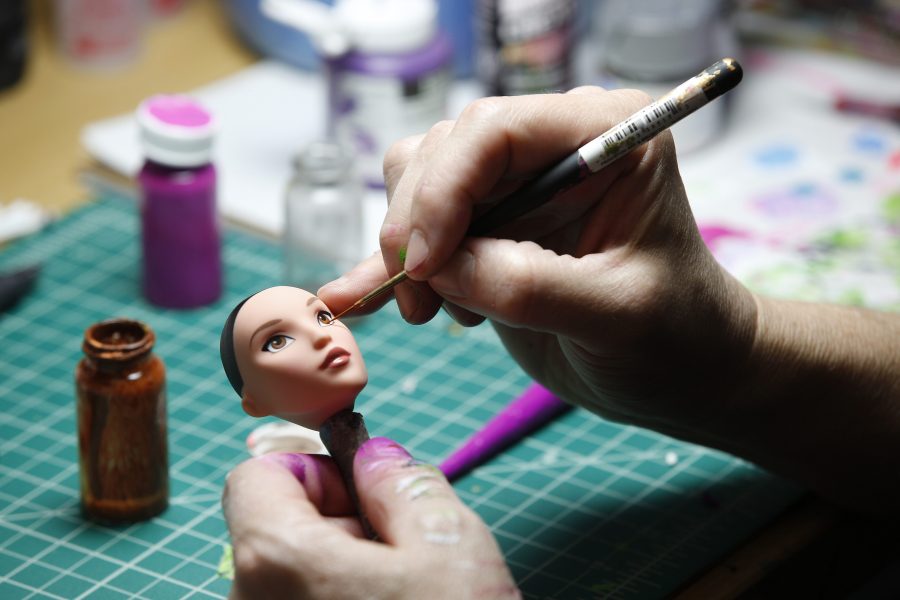Looking beyond ‘Transformers’: With a ‘G.I. Joe’ reboot and ‘My Little Pony’ in the works, Hasbro aims to create its own Marvel-size movie universe
Hasbro characters are all made by hand and painted before mass production. (Kirk McKoy/Los Angeles Times/TNS)
March 23, 2017
LOS ANGELES — Ten years ago, Hasbro dusted off its ‘80s action figure line Transformers and turned it into a blockbuster movie that was so successful it has spawned four sequels and counting.
In the franchise, the shape-shifting Autobots and Decepticons are sentient machines who engage in extreme warfare. But they are first and foremost money machines that have so far grossed more than $3.7 billion in cinemas worldwide, turning Hasbro into a major Hollywood player.
As Paramount prepares to release “Transformers: The Last Knight” in June, Hasbro is already looking beyond Planet Cybertron for new cinematic universes to build. Thanks to a vast store of intellectual property, the company can afford to think big — Marvel-size big. And it is starting to take a more active role in producing and financing some of its projects.
This represents a strategic shift for Hasbro. In the past, the company has acted as a non-financing producer on movies based on its toys and games, partnering with studios and other production houses. Hasbro doesn’t license its brands to Hollywood studios, choosing instead to participate in the development, writing and marketing processes.
But with the October release of its animated feature “My Little Pony,” Hasbro will be able to boast the first fully financed movie under its Allspark movie label, signaling a new level of industry clout.
“We like to say we’re a very well-funded start-up,” said Stephen Davis, who heads Hasbro Studios, where he oversees the movie, TV and digital content division of the toy giant. By taking the leap into film financing, he said, Hasbro will be able to release and market films “with greater flexibility.”
To further solidify its Hollywood presence, Hasbro Studios recently moved into a sleek new office space in Burbank that houses the studio’s executive staff as well as teams devoted to animation and toy prototyping.
A countdown clock in the main conference room ticks off the time left until “My Little Pony” opens in theaters.
Leaders said the new headquarters, almost double the size of their previous space, allows for a close physical collaboration between the entertainment and toy design teams.
The cross-marketing of movies and merchandise is a key component of Hasbro’s strategy, since new movies often reactivate consumer interest in existing toy lines.
“You clearly want to make a movie that stimulates the brand,” Davis said.
Hasbro Studios declined to discuss revenue. The parent company, based in Rhode Island, recently reported that fourth-quarter revenue jumped 11 percent year-over-year to $1.63 billion, with net earnings rising 10 percent to $192.7 million — in part because of licensing partnerships with Disney for princesses and Frozen merchandise.
So far this year, the stock has risen nearly 30 percent.
The company also has big plans to team up with Paramount again on movies featuring a rebooted G.I. Joe with a revamped look intended to appeal to younger audiences.
The action-figure line was turned into a movie in 2009, with a sequel four years later. Both “G.I. Joe” movies were modest box-office successes and didn’t generate the level of global appeal as the “Transformers” movies.
Simon Waters, who oversees consumer products at Hasbro Studios, said the company wants to take “a more millennial approach.”
“The world has changed, and I think you’re going to see G.I. Joe changing with it,” he said. “There’s going to be a much more contemporary approach to the whole franchise, and that will allow us to develop different characters.”
Davis added: “We hope to create a head snap. It’s a different kind of ‘Joe’ — one that still resonates with ‘Joe’ fans but brings in an uninitiated audience and expands the audience internationally and domestically.”
If all goes as planned, the cinematic universe will eventually incorporate characters from other popular Hasbro properties including ROM, Micronauts, Visionaries and M.A.S.K.
The projects are still in the writing phase, and Hasbro declined to say when the first installment would be released.
Some industry analysts are skeptical that Hasbro will be able to replicate its success with Transformers.
“It only goes so deep in terms of toys and board games,” said Shawn Robbins, chief analyst at Boxoffice.com. “But that’s not to say that demand can’t be manufactured on some level. Nostalgia is a big driver.”
Nostalgia wasn’t enough to save 2012’s “Battleship,” released by Universal, from sinking at the box office. The movie grossed more than $300 million worldwide, but production costs are estimated to have exceeded $200 million.
“I will tell you from my heart of hearts, ‘Battleship’ was a great story,” Davis said. But he added that in hindsight, he would have revisited the movie’s budget, marketing plan and release date.
But “Ouija,” another Universal partnership, was a low-budget hit when it was released in 2014. The horror movie based on the occult game spawned a sequel last year.
Still, Hasbro isn’t rushing to turn every brand into a movie or TV show. For example, Davis said, there are no plans to turn Nerf, Hasbro’s biggest revenue generator, into a movie.
For now, Hasbro is focused on a handful of immediate projects such as “My Little Pony,” to be released by Lionsgate.
The company’s first animated feature is intended to build on the popularity of its animated series on Discovery Family.
Hasbro is also launching the new animated Netflix series “Stretch Armstrong” later this year and continues to create digital content for kids, such as the YouTube animated series “Hanazuki,” which debuted in January.
In the near term, Hasbro is working with Paramount on more “Transformers” sequels, including a spin-off focusing on the Bumblebee character that is set to open next year. “It really is a brand-new ‘Transformers’ that harkens back to the first ‘Transformers’ in terms of look and feel,” Davis said.
Other competitors have followed Hasbro’s lead in turning their toys into movies. Lego has had successes with “The Lego Movie” in 2014 and “The Lego Batman Movie,” released earlier this year.
Mattel, based in El Segundo, has an entertainment division and is looking to turn its Hot Wheels brand into a movie. But last year, the company flopped with “Max Steel,” based on its action figure line.
“Toy companies probably have no more likelihood of succeeding at making a profitable movie than anybody else. It’s still risky and expensive,” said Sean McGowan, managing director at Liolios Group, an investor relations company.
“There are a lot of cautionary tales. But there’s still an allure.”
While the multiplex and TV are still key for Hasbro, the studio is spending more time pursuing other media, especially mobile games. It has a stake in Backflip Studios, a mobile game maker, and recently partnered with developer Kabam on a multiplayer “Transformers” game.
Other titles include mobile games based on “My Little Pony” and the board game “Clue.”
“Kids and adults spend more time on their phones than on any other screen,” Davis said. “The idea is for us to be on every platform.”
———
©2017 Los Angeles Times
Visit the Los Angeles Times at www.latimes.com
Distributed by Tribune Content Agency, LLC.








